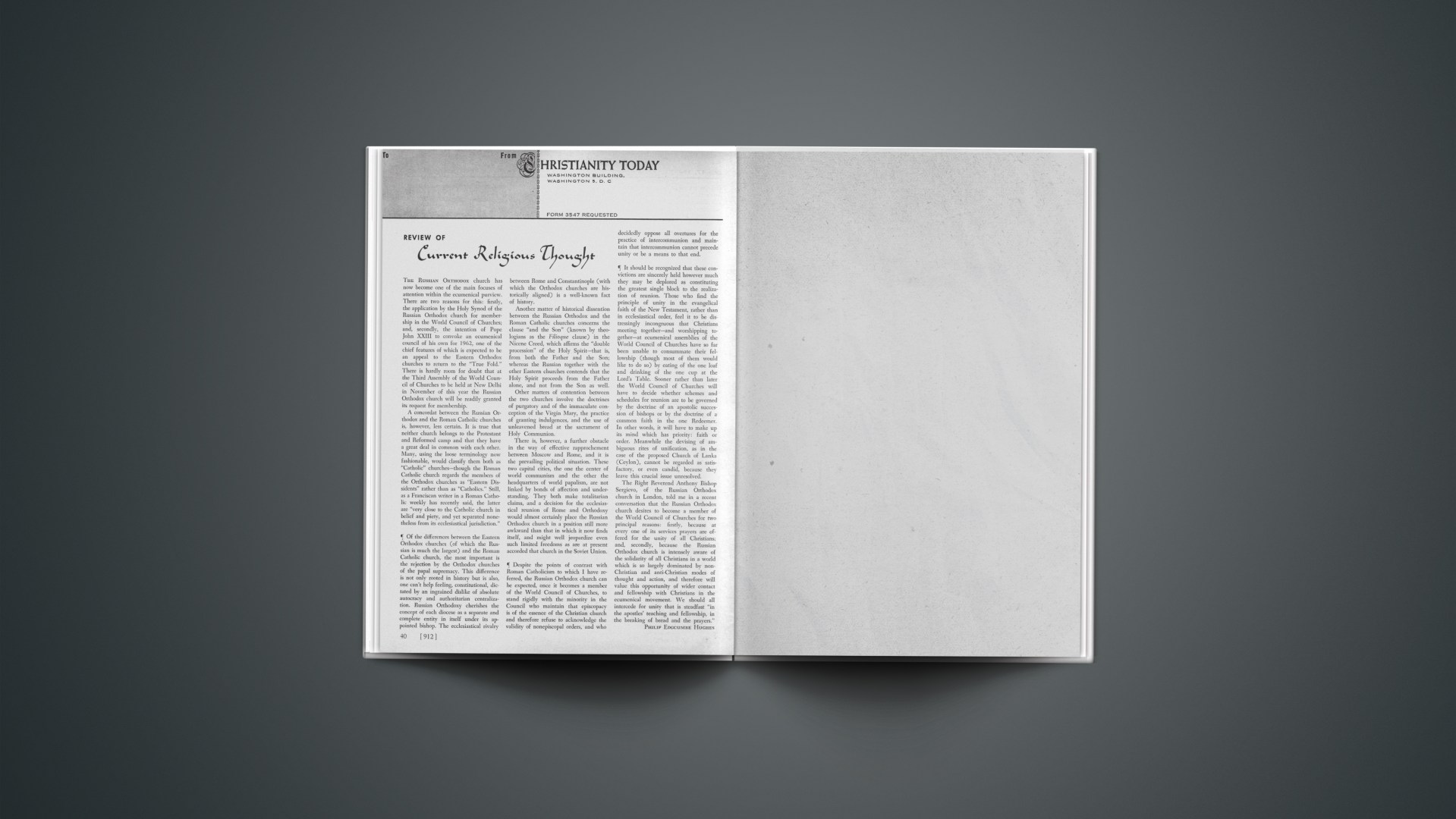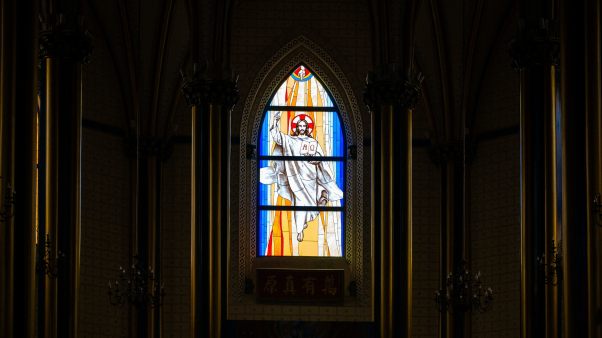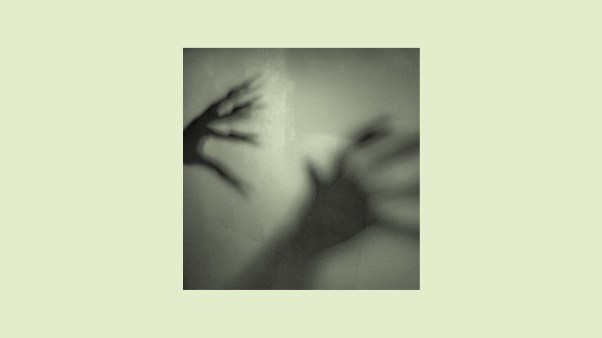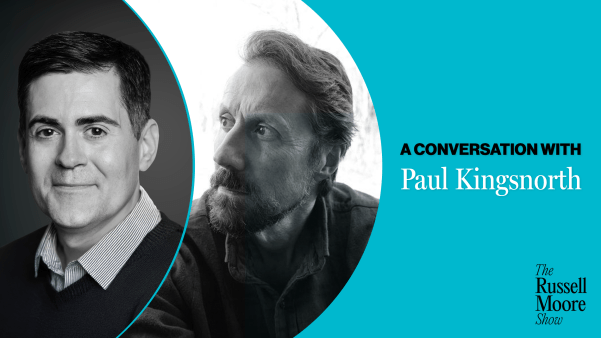The Russian Orthodox church has now become one of the main focuses of attention within the ecumenical purview. There are two reasons for this: firstly, the application by the Holy Synod of the Russian Orthodox church for membership in the World Council of Churches; and, secondly, the intention of Pope John XXIII to convoke an ecumenical council of his own for 1962, one of the chief features of which is expected to be an appeal to the Eastern Orthodox churches to return to the “True Fold.” There is hardly room for doubt that at the Third Assembly of the World Council of Churches to be held at New Delhi in November of this year the Russian Orthodox church will be readily granted its request for membership.
A concordat between the Russian Orthodox and the Roman Catholic churches is, however, less certain. It is true that neither church belongs to the Protestant and Reformed camp and that they have a great deal in common with each other. Many, using the loose terminology now fashionable, would classify them both as “Catholic” churches—though the Roman Catholic church regards the members of the Orthodox churches as “Eastern Dissidents” rather than as “Catholics.” Still, as a Franciscan writer in a Roman Catholic weekly has recently said, the latter are “very close to the Catholic church in belief and piety, and yet separated nonetheless from its ecclesiastical jurisdiction.”
Of the differences between the Eastern Orthodox churches (of which the Russian is much the largest) and the Roman Catholic church, the most important is the rejection by the Orthodox churches of the papal supremacy. This difference is not only rooted in history but is also, one can’t help feeling, constitutional, dictated by an ingrained dislike of absolute autocracy and authoritarian centralization. Russian Orthodoxy cherishes the concept of each diocese as a separate and complete entity in itself under its appointed bishop. The ecclesiastical rivalry between Rome and Constantinople (with which the Orthodox churches are historically aligned) is a well-known fact of history.
Another matter of historical dissention between the Russian Orthodox and the Roman Catholic churches concerns the clause “and the Son” (known by theologians as the Filioque clause) in the Nicene Creed, which affirms the “double procession” of the Holy Spirit—that is, from both the Father and the Son; whereas the Russian together with the other Eastern churches contends that the Holy Spirit proceeds from the Father alone, and not from the Son as well.
Other matters of contention between the two churches involve the doctrines of purgatory and of the immaculate conception of the Virgin Mary, the practice of granting indulgences, and the use of unleavened bread at the sacrament of Holy Communion.
There is, however, a further obstacle in the way of effective rapprochement between Moscow and Rome, and it is the prevailing political situation. These two capital cities, the one the center of world communism and the other the headquarters of world papalism, are not linked by bonds of affection and understanding. They both make totalitarian claims, and a decision for the ecclesiastical reunion of Rome and Orthodoxy would almost certainly place the Russian Orthodox church in a position still more awkward than that in which it now finds itself, and might well jeopardize even such limited freedoms as are at present accorded that church in the Soviet Union.
Despite the points of contrast with Roman Catholicism to which I have referred, the Russian Orthodox church can be expected, once it becomes a member of the World Council of Churches, to stand rigidly with the minority in the Council who maintain that episcopacy is of the essence of the Christian church and therefore refuse to acknowledge the validity of nonepiscopal orders, and who decidedly oppose all overtures for the practice of intercommunion and maintain that intercommunion cannot precede unity or be a means to that end.
It should be recognized that these convictions are sincerely held however much they may be deplored as constituting the greatest single block to the realization of reunion. Those who find the principle of unity in the evangelical faith of the New Testament, rather than in ecclesiastical order, feel it to be distressingly incongruous that Christians meeting together—and worshipping together—at ecumenical assemblies of the World Council of Churches have so far been unable to consummate their fellowship (though most of them would like to do so) by eating of the one loaf and drinking of the one cup at the Lord’s Table. Sooner rather than later the World Council of Churches will have to decide whether schemes and schedules for reunion are to be governed by the doctrine of an apostolic succession of bishops or by the doctrine of a common faith in the one Redeemer. In other words, it will have to make up its mind which has priority: faith or order. Meanwhile the devising of ambiguous rites of unification, as in the case of the proposed Church of Lanka (Ceylon), cannot be regarded as satisfactory, or even candid, because they leave this crucial issue unresolved.
The Right Reverend Anthony Bishop Sergievo, of the Russian Orthodox church in London, told me in a recent conversation that the Russian Orthodox church desires to become a member of the World Council of Churches for two principal reasons: firstly, because at every one of its services prayers are offered for the unity of all Christians; and, secondly, because the Russian Orthodox church is intensely aware of the solidarity of all Christians in a world which is so largely dominated by non-Christian and anti-Christian modes of thought and action, and therefore will value this opportunity of wider contact and fellowship with Christians in the ecumenical movement. We should all intercede for unity that is steadfast “in the apostles’ teaching and fellowship, in the breaking of bread and the prayers.”










